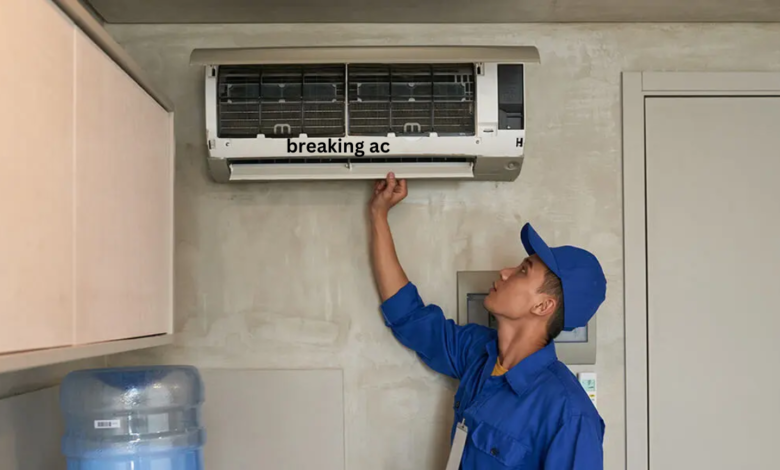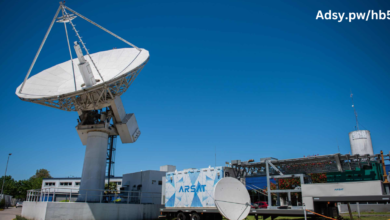Understanding and Fixing Your AC: A Complete Guide to Troubleshooting “Breaking AC” Issues

When your air conditioner (AC) breaks down in the middle of a heatwave, it can be frustrating and uncomfortable. An AC is an essential appliance in most households and businesses, but like any complex machine, it can experience problems over time. Understanding the causes of a “breaking AC” and knowing how to troubleshoot can save you time, money, and stress. This comprehensive guide will explain the common causes of AC breakdowns, how to identify warning signs, and provide effective troubleshooting steps. We’ll also share prevention tips to ensure your AC stays in good working condition for years to come.
What Causes an AC to Break?

There are several reasons why an air conditioning unit might break down, ranging from simple issues like dirty filters to more complicated problems such as refrigerant leaks. Understanding the causes of AC failures can help you diagnose problems and prevent future breakdowns.
Power Issues
The first thing to check when your AC isn’t functioning properly is the power supply. A tripped circuit breaker or a blown fuse can cut off the breaking ac electricity to the AC unit, leaving it powerless. Additionally, power surges caused by thunderstorms or faulty wiring can damage the electrical components inside the system, leading to malfunctions. It’s always a good idea to check your circuit breakers and fuses when the AC isn’t running.
Refrigerant Leaks
One of the most common reasons for an AC to stop cooling properly is a refrigerant leak. Refrigerant is the substance that absorbs heat from the air inside your home and releases it outside, allowing your system to cool effectively. If there’s a refrigerant leak, your AC won’t be able to cool the air properly. You might notice warm air blowing from the vents, or the unit might start working harder than usual. Refrigerant issues often require professional repair, as handling refrigerants can be dangerous.
Frozen Coils and Inadequate Airflow
Another common problem is frozen coils. When the evaporator coils freeze, the AC struggles to cool the air, and it may even stop working breaking ac altogether. Frozen coils often result from poor airflow, such as clogged filters, blocked vents, or malfunctioning fans. When airflow is restricted, the evaporator coils can’t properly absorb heat, causing condensation to freeze on the coils. Regular cleaning and maintenance can help prevent this issue.
Faulty Compressor
The compressor is the heart of an AC unit, circulating refrigerant throughout the system. If the compressor malfunctions, the entire AC system will fail to cool properly. Compressor failure can be caused by electrical issues, refrigerant leaks, or simply the age of the unit. Signs of a failing compressor include a humming noise or a noticeable lack of cool air.
How to Identify Signs of a Breaking AC
Recognizing the early signs of a breaking AC can help you address issues before they worsen. By staying vigilant, you can save yourself from more expensive repairs and unnecessary discomfort.
Unusual Sounds
If your AC starts making strange noises like clicking, buzzing, or hissing, it’s often a sign that something is wrong. A clicking sound could indicate that the fan motor is malfunctioning, while a buzzing sound may point to an electrical issue. Hissing breaking ac could be a sign of a refrigerant leak, which requires immediate attention. If you hear any unusual noises, it’s important to investigate the source right away.
Warm Air Blowing
Another telltale sign that your AC is breaking down is if it starts blowing warm air, even though it’s set to a low temperature. This issue could be caused by a refrigerant leak, a malfunctioning compressor, or a thermostat problem. If the unit is running but not cooling, you may need to call a professional to inspect the system.
Constant Running
When your AC unit is running continuously without reaching the desired temperature, it could be a sign of an internal malfunction. This issue breaking ac might occur due to dirty coils, a clogged air filter, or refrigerant leaks. If the AC fails to reach the set temperature despite running for an extended period, it may be struggling to maintain proper cooling due to a technical fault.
Water Leakage
Water pooling around the air conditioning unit could indicate a drainage issue, refrigerant leak, or frozen coils. A clogged drain line or dirty filters can cause the condensation to back up and leak from the unit. This could lead to water damage if left unresolved, so it’s crucial to identify the cause of the leak quickly.
Increased Energy Bills
If you notice a sudden spike in your energy bills without any changes in your AC usage, it might be a sign that your AC is not functioning efficiently. Problems such as dirty filters, clogged coils, or refrigerant leaks can cause your AC to work harder than usual, consuming more energy to cool your space. Regular maintenance is essential for keeping your AC operating at its optimal efficiency.
Troubleshooting Steps for a Breaking AC
Before calling a professional technician, there are several troubleshooting steps you can take to identify and possibly fix a broken AC. These steps can help you save time and avoid unnecessary repair costs.
Basic Checks
Start by checking the most straightforward issues. Ensure that the AC is properly plugged in and that the circuit breaker hasn’t been tripped. Check the breaking ac thermostat settings to make sure they are accurate. If the filter is dirty, replace it immediately as clogged filters can impede airflow and cause the unit to malfunction. Inspect the vents and air ducts for any blockages that may restrict airflow.
Intermediate Troubleshooting
If basic checks don’t resolve the problem, you may need to dive a little deeper. Check the refrigerant levels—if they’re low, there may be a leak. Refrigerant leaks should only be handled by a licensed technician, as they require special tools and expertise. Clean the evaporator and condenser coils to ensure the system can properly release heat. If the fan isn’t working, it could be due to an electrical issue or a broken fan motor.
When to Call a Professional
Some problems, like refrigerant leaks or compressor failure, require the expertise of a professional HVAC technician. Attempting to fix these issues on breaking ac your own could worsen the situation or even cause safety risks. Always call a licensed technician when you encounter these types of issues to ensure the job is done safely and effectively.
How to Prevent Your AC from Breaking Down
Prevention is always better than repair, and regular maintenance can go a long way in extending the life of your AC unit. Here’s how you can keep your AC running smoothly:
Regular Maintenance
Schedule annual or bi-annual checkups with a professional HVAC technician. They can inspect and clean all the key components of your system, including the breaking ac refrigerant levels, compressor, coils, and condenser. Regular maintenance can prevent small issues from turning into major problems.
Clean and Replace Filters
One of the easiest and most effective ways to keep your AC functioning properly is to clean or replace the air filters regularly. A dirty filter can restrict airflow, cause the coils to freeze, and increase the workload on the unit. Make it a habit to check and replace your filters every 1-3 months, especially during peak cooling season.
Maintain Adequate Airflow
Ensure that there are no obstructions around the AC unit, both inside and outside. Keep furniture, curtains, and debris away from vents to allow for proper airflow. Also, trim any plants or bushes around the outdoor condenser unit to ensure that it can release heat effectively.
Conclusion
Air conditioning breaking ac can be inconvenient and uncomfortable, but understanding the causes and troubleshooting steps can help you address problems early on. Regular maintenance, attention to warning signs, and professional help when needed are key to keeping your AC running smoothly and efficiently. By following these tips, you can extend the lifespan of your unit and avoid costly repairs.
FAQs
- What should I do if my AC is blowing warm air?
- Check for refrigerant leaks, ensure the thermostat is set correctly, and inspect the air filter for blockages.
- How often should I change my AC filter?
- Replace the air filter every 1-3 months, especially during high usage periods like summer.
- Can I fix a refrigerant leak myself?
- No, refrigerant leaks should be handled by a licensed HVAC technician due to safety concerns.
- Why is my AC running constantly and not cooling?
- This could be caused by dirty coils, low refrigerant levels, or an issue with the compressor.
- What are the signs that my AC compressor is failing?
- A humming noise, lack of cool air, or the AC running without cooling can indicate a compressor failure.
- How much does it cost to repair an AC unit?
- Repair costs can vary, but typical repairs range from $100 to $1,000 depending on the issue.
- Can regular maintenance prevent my AC from breaking down?
- Yes, regular maintenance helps prevent issues and ensures the system runs efficiently.
- What are the risks of ignoring AC issues?
- Ignoring issues can lead to more expensive repairs, system failure, or even permanent damage to the unit.
- When is it time to replace my AC instead of repairing it?
- If the repair costs exceed 50% of the cost of a new unit, or if the AC is more than 10-15 years old, replacement may be more cost-effective.
You May Also Read: https://bristomagazine.com/washington-nationals-vs-atlanta-braves-match-player-stats/





